Mediators brought in to ease tensions over Loyalist parades in Glasgow
- Published
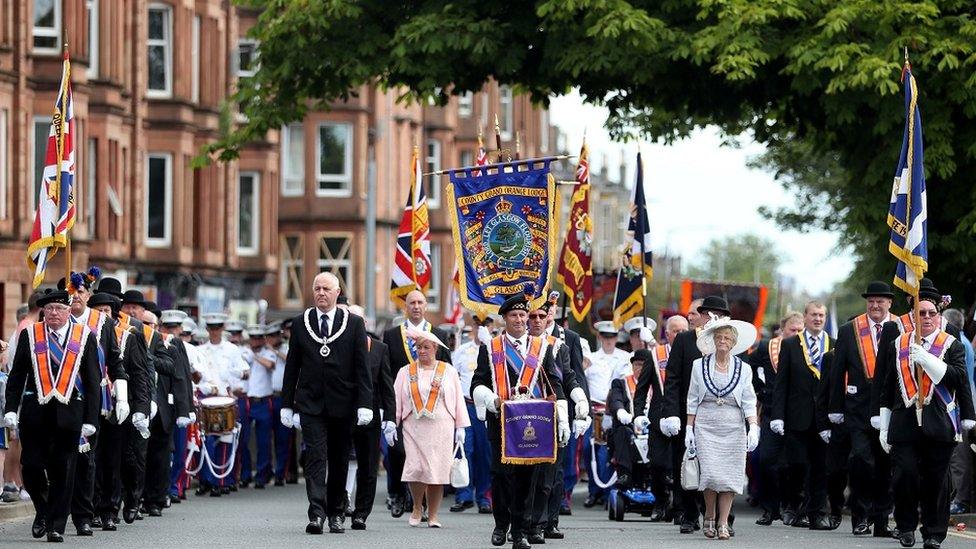
The annual Battle of the Boyne celebration has been cancelled this July
The Scottish government has commissioned a civic mediation company in an attempt to ease tensions over Loyalist parades in Glasgow.
The Centre for Good Relations is a not-for-profit enterprise with experience working with race riots and EU migration in parts of England.
It will receive £50,000 to set up structured talks on the parades issue during 2020/21.
It comes as the Orange Order's annual Battle of the Boyne celebration has been cancelled this July for the first time since the Second World War.
'At least they can talk'
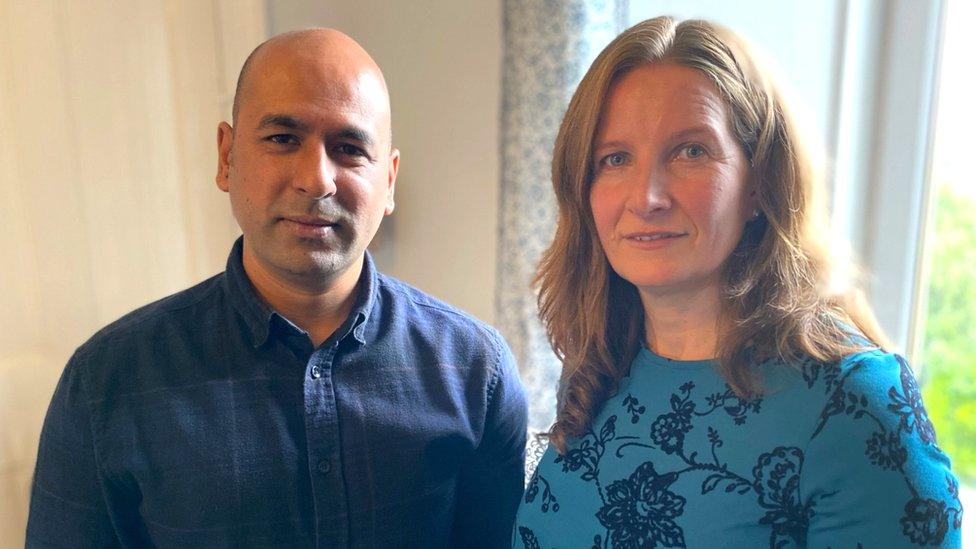
Abdul Rahim and Sam Tedcastle have been commissioned to run a year-long project
Abdul Rahim and Sam Tedcastle are a married couple who run the Centre for Good Relations.
They have nearly two decades' experience mediating in communities affected by racial tension and far right demonstrations, including Burnley in Lancashire and Boston in Lincolnshire.
The firm has been commissioned to run a year-long project aimed at providing "space" to resolve disputes over marching routes in Glasgow, particularly those passing Catholic churches.
They are currently in the process of contacting various parties involved in the dispute. The Catholic Church, Loyal Orders such as the Orange Lodge, Police Scotland and Glasgow City Council are expected to take part in discussions.
Ms Tedcastle told BBC Scotland's The Nine: "At the moment, things go wrong and potentially violence erupts.
"We want to get to a point where people see things starting to escalate and instead of it being allowed to escalate, they say actually, no, we need to talk about this.
"If we are doing that when things are really heated, it's not a good time to talk. If we do it before and people are prepared, then they've built that relationship and they are still able to talk to each other.
"They might never love each other but at least they can talk to each other."
Mr Rahim added: "I think the key thing to say is it's not us as an organisation making things better for the parties. We will create the mechanisms or the process of the space, where the parties can work out how to make things better themselves.
"In mediation, we are not consultants, we're not community development workers. We are not coming in with ideas of how to make things better.
"But we come with the method to allow those conversations that need to be had to take place."
'Simmering tensions'
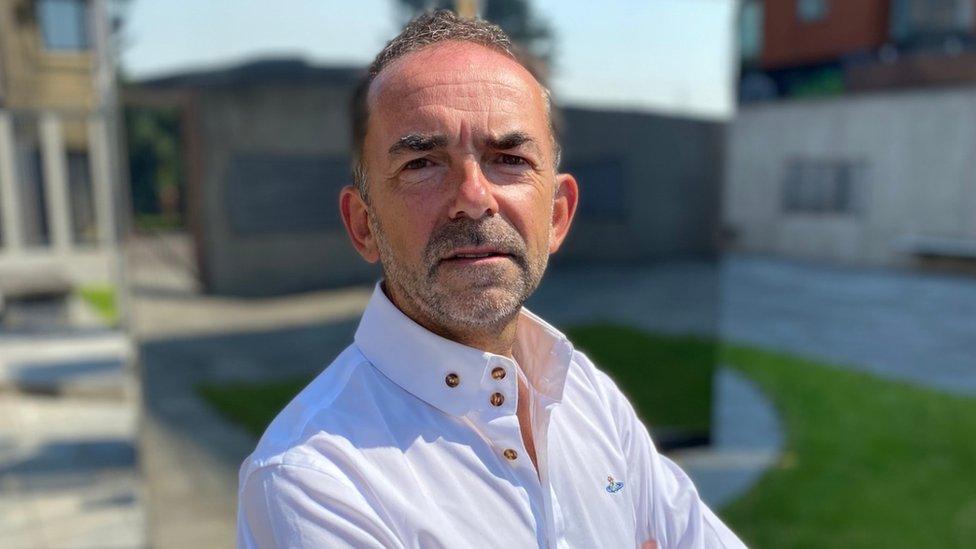
Ronnie Convery said the church had already taken part in talks
Over the last two years, Glasgow has seen a number of high-profile incidents around parades by Protestant Loyal Orders and Irish Republican demonstrations.
These included an attack on a Catholic priest by a follower of an Orange parade in 2018, violent protests at a Republican march in 2019, and a number of parades being cancelled by Glasgow City Council.
Ronnie Convery, spokesman for the Archdiocese of Glasgow, said the Catholic church had already entered talks with the Orange Order after "simmering tensions" brought the issue to the forefront.
"We have no objections to the loyal orders parading through the streets," he told BBC Scotland's The Nine.
"We ask simply that they choose a time and route that does not cause fear and alarm, particularly to the Catholic community trying to get in and out of their churches, but also to the wider community going about their business.
"I think it's absolutely without doubt that, for years, parishioners have felt fear and alarm as they have tried to get in and out of churches while these marches take place.
"There is a sense of tension in the air, a sense of fear, because of the insults that would be hurled, because of the aggressive environment created around these marches."
'We were treated wrongly'
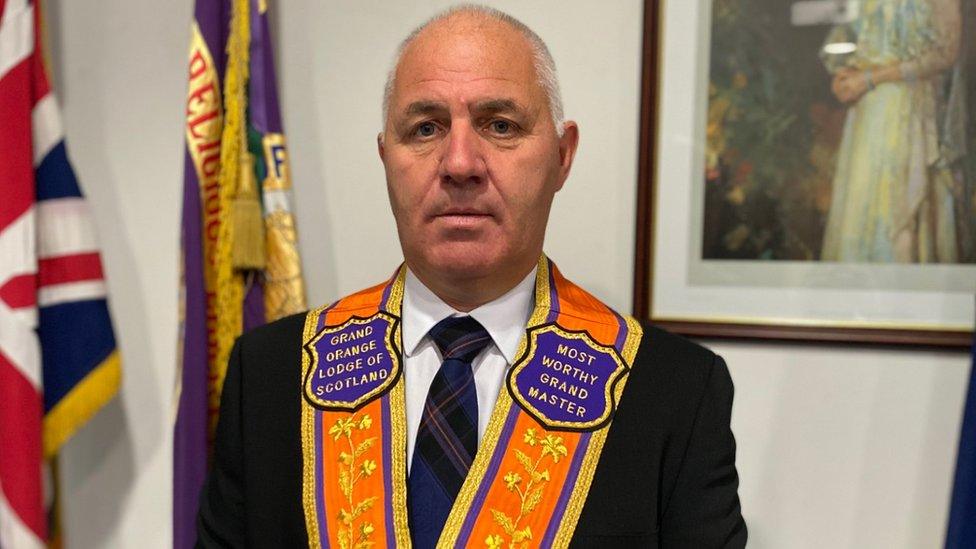
Jim McHarg said the organisation had a "wonderful history"
Jim McHarg, Grand Master of the Orange Order in Scotland, insists his organisation stands for freedom of faith.
He told The Nine that Loyal Orders were already engaging lawfully through the legal processions process and in talks with the Catholic Church.
But he said campaigners - such as the Call It Out group, who believe Orange marches are anti-Catholic - were "fuelling a fire".
Mr McHarg said: "I think we have people who don't understand what we believe and what we are trying to do, they are probably ignorant of what we are. And I don't mean they are ignorant people, because that's not the case.
"But people don't really know about us, and we are trying our best to open the doors to people, to be questioned. This organisation has a wonderful history. We have nothing to be ashamed of, plenty to be proud of.
"What we don't want are people who are intent on having a drink-fest and trying to cause trouble.
"We were treated wrongly by the council [who] banned five parades right across the board. It was pretty sad. It was vindictive if you like, because these lodges had done nothing wrong and yet they were paying the penalty for something that happened at somebody else's parades."
Mr McHarg said he did not think Scotland had a problem with sectarianism, adding: "The government of this country has been trying for many, many years to determine what sectarianism actually means, and they've still not come up with it.
"Nobody can put their finger on what sectarianism actually means."
Protecting rights
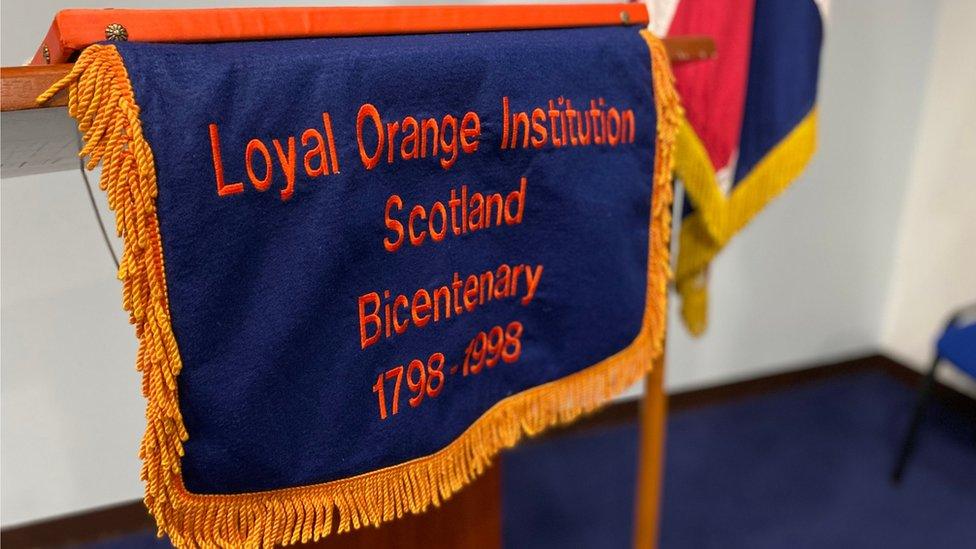
In each of the last five years, Glasgow saw between 300 and 400 public processions - most of them by Loyal Orders.
By contrast, there were less than 20 Republican marches each year.
The local authority won a court case last year after the Orange Order challenged a decision by the council's procession committee to alter a parade's route away from a Catholic church in the east end.
But it does not mean the council can use a "blanket ban" on any parade route.
Colin Edgar, spokesman for Glasgow City Council, said that would not be legal.
"Part of the problem in the public perception of it is that people don't understand that each procession is individual and separate to each other processions," he said.
"I think sometimes people think, well, you must be able to take a decision that applies to all processions equally. But certainly you can't simply use the law to apply a rule to all processions equally."
He said focus groups involving members of the public believe that there is a need to protect rights of assembly for unrelated political causes.
"You don't want to see other people having their rights taken away, because it may one day lead to you having your rights taken away."
'No compromise'
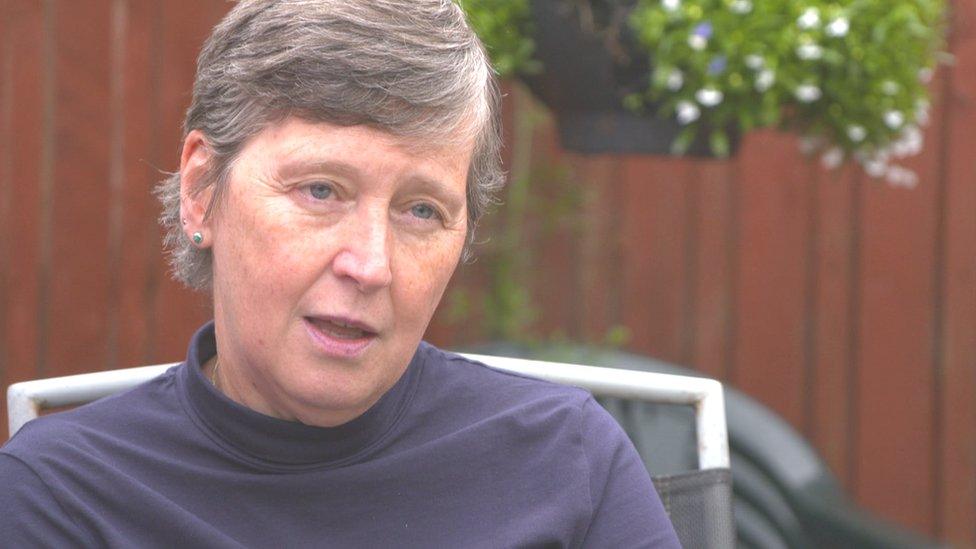
Jeanette Findlay is sceptical about the plans
Jeanette Findlay runs the anti-sectarian campaign group Call It Out. It was established in 2018 and held a series of protests at Orange parades over what it claims is the organisation's anti-Catholic and anti-Irish bigotry.
She told The Nine she has already been in touch with the Centre for Good Relations but is sceptical about plans for civic mediation.
Ms Findlay also stated that "under no circumstances" would she enter talks with Loyalists.
She said: "To discuss what? How much discrimination I was willing to accept? How much abuse would be OK? Can I compromise on our rights as a community to go about our business safely?
"I don't know what we'd be discussing. I would never rule out talking to anyone as an individual, but I'd only be going into a situation to discuss a compromise if there was something to compromise on."
'Build relationships'
A Scottish government spokesperson said the importance of "constructive dialogue to foster and strengthen good relations" was among the recommendations made by Dr Michael Rosie.
He had been asked to review the progress, external which had been made on meeting the recommendations of his 2016 Independent Report on Marches, Parades and Static Demonstrations in Scotland.
"We are committed to working with others to ensure that engagement takes place for the benefit of our communities," said the spokesperson.
"The Scottish government has commissioned the independent Centre for Good Relations to undertake facilitated discussions with march organisers and others involved in facilitating marches and parades, to help build relationships and improve the organisation and running of these events."